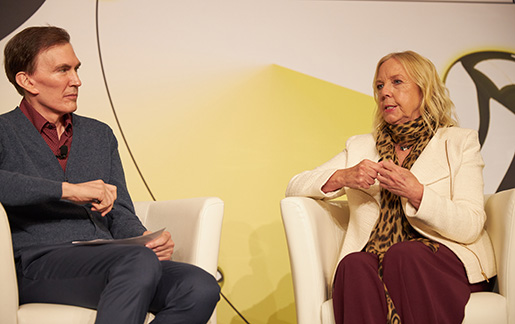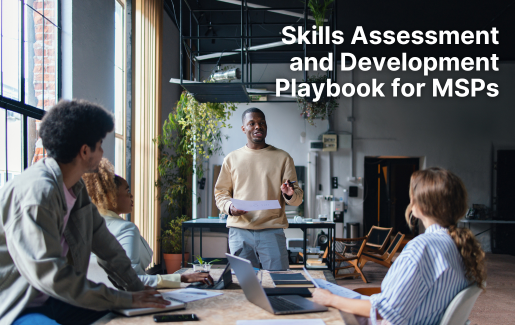 Deborah Meaden has been a passionate businesswoman, entrepreneur and for nearly 20 years helped launch a number of successful careers and businesses as an investor on the hit UK TV show, Dragons Den—and she’s learned a lot along the way that she is happy to share with other leaders.
Deborah Meaden has been a passionate businesswoman, entrepreneur and for nearly 20 years helped launch a number of successful careers and businesses as an investor on the hit UK TV show, Dragons Den—and she’s learned a lot along the way that she is happy to share with other leaders.
Meaden spoke with CompTIA CEO Todd Thibodeaux at the CompTIA EMEA Member and Partner Conference about her career, what she looks for in a successful business and what to expect in the future. Here’s an excerpt of what she had to say.
As a successful business leader, how much obligation do you feel to give back?
I’m not sure obligation is the right word. I would say it’s really important in life to KNOW what you care about. A lot of entrepreneurs spend their life working really hard, then they don’t know what to do with their extra time because they don’t know what they care about outside of work. I feel lucky that I have found things to really care about. So, it’s not an obligation, but I feel fortunate. I’ve got a voice, a platform. So maybe the obligation is to use that platform.
How do you choose a charity to get involved in?
I think everyone has their own cares. Everyone can do what they can do. I know what I care about. I know how much time I want to give to organizations and causes that I care about. It’s really important we do our own thing. That way it’s authentic and it’s not a job.
I get asked to get involved in a lot. The first thing I ask is why me? Can I add to that, make a difference? I have a leaning toward the smaller end of charities. There’s a more direct impact and not bureaucracies wearing it down. Those are the ones I like to get involved in.
What do you look for in a charitable leader vs. a business leader?
I don’t think it should be different. I have always said profit should not just be defined as cash, but as the outcomes you want from the business. Charities are the same. What are outcomes that I care about. Charity leaders, like business leaders, should be able to clearly identify culture and the values of a business. That’s particularly becoming important to the next generation too.
What is the biggest mistake you see that entrepreneurs make?
It’s a mistake, but it’s also a joy, that they don’t know what they don’t know. They think things should (will) happen twice as fast and cost half the money. That leads to all sorts of problems. “Everything is great, great, great … oh, we’ve run out of money.” You want enthusiasm but not overenthusiasm. So it’s a negative and a positive, the naivety around that.
It takes a special person to say I’m going to start this thing, but 80% of companies I see have no hope because of their business model. You talk to entrepreneurs, and they’re like oh, budgets. But that’s the math, that’s the thing really helps you fuel the business. I work quite a bit around “see this budgets as an incredibly powerful tool and it gives you the power. You’re running the business, not the business running you.”
When have you invested in something that didn’t turn out successful and why?
First, let’s have a positive start. There was a rather sweet business, two women came up with an idea for a sunscreen applicator that teachers and children could use. You don’t need to apply it by hand. That business turned in £75,000 2 ½ years ago and this year it will do £10 million. That was for two brilliant women that started it with a really simple, really good product.
I’ve only had three complete failures on the show and they’ve not been around numbers, but around people that think they want a thing, then when they understand what it takes to do that, they don’t want it at all. You’re not happy, I’m not happy, this is not working. Life’s too short.
Most fun thing about being pitched business ideas on TV?
I love entrepreneurs. Sitting in that seat, I think I am the luckiest person alive. The entrepreneurship, the creative energy, they don’t know what they can achieve. Every year I think how much more new stuff can I see? And every year people walk through the doors with something and I think why didn’t I think of that? I love the energy, the buzz.
What’s your relationship with innovation and tech? Are you an early adopter?
I hope so. It’s essential to know what’s going on. People need to know what’s available to them. I’m never the expert in any room and recognizing that is important. I just need to know what I need to know and who I need to find.
What’s in your tech survival kit if you were stranded somewhere?
Just my mobile phone. I’ve never worn a watch. Literally my mobile phone. I left my luggage in an unattended room upstairs. I said the only thing I want is my mobile phone.
What camp are you in around artificial intelligence (AI)? Will it kill us or free us?
So much in our world is love or hate, black or white. But I think the truth always exists somewhere in the middle and I think that is the same for AI. I find it terrifying and incredibly exciting. I hope it finds that way in the middle so that we can use it in its most useful form. I don’t know where it’s going to go yet but we’re also doing amazing things already.
See more CompTIA EMEA Member and Partner Conference highlights.

 Add CompTIA to your favorite RSS reader
Add CompTIA to your favorite RSS reader

